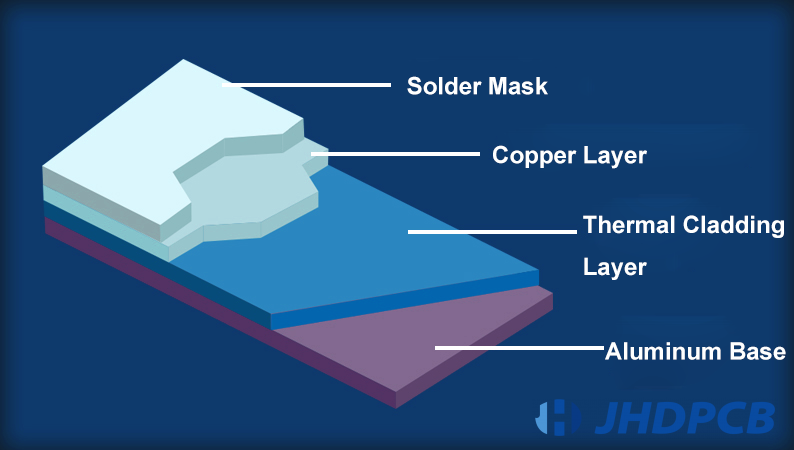Aluminum PCB
What is Aluminum PCB?
Aluminum PCB is a kind of printed circuit boards that contain a thin thermal cladding layer and aluminum base. They are also known as Aluminum CCL(Aluminum Copper Clad Laminate), MCPCB (Metal Composite Printed Circuit Board), IMS (Insulated Metal Substrate), Thermally Conductive PCB, etc. Actually they all refer to the same PCB. Aluminum PCBs are the most common and the most popular type, among all metal core PCBs. The base material is composed of aluminum core and a thermal cladding layer, which can efficiently dissipate heat, cool the components and extend the life of the components. Currently, aluminum pcbs are considered a solution for high power applications, such as led street lighting, car headlight and etc.
JHDPCB has top first-class equipment, rich production experience and huge cost advantage. Our large-scale production allows customers to obtain higher quality aluminum PCBs. A complete supply chain system helps customers realize PCB project requirements with fewer cycles.
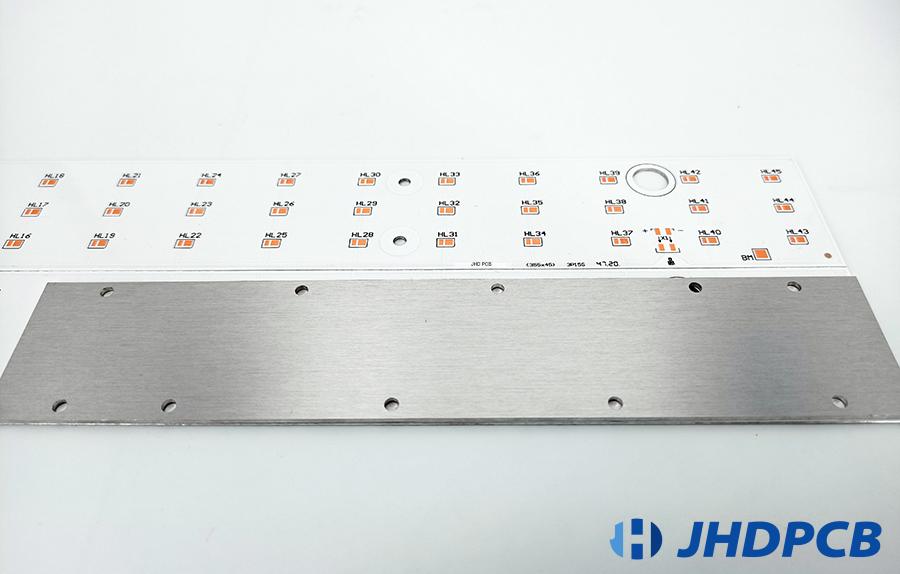
JHD Aluminum Substrate Product Display:
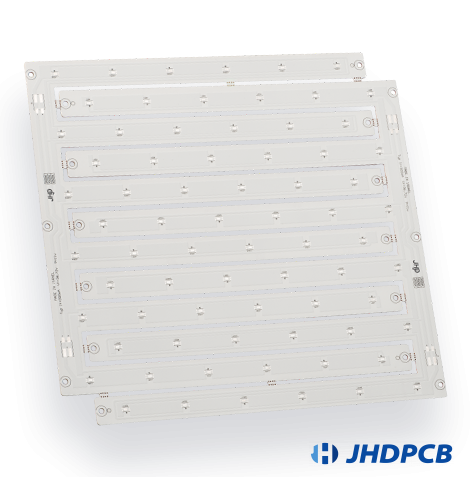
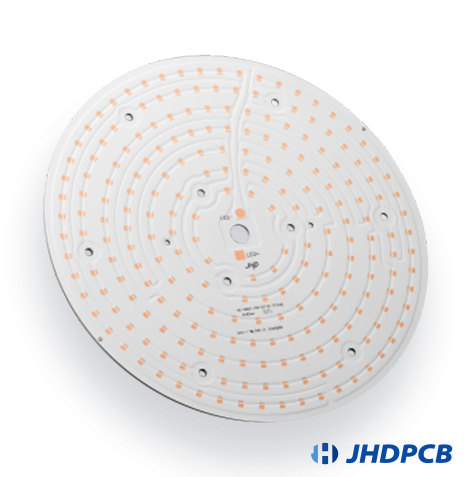
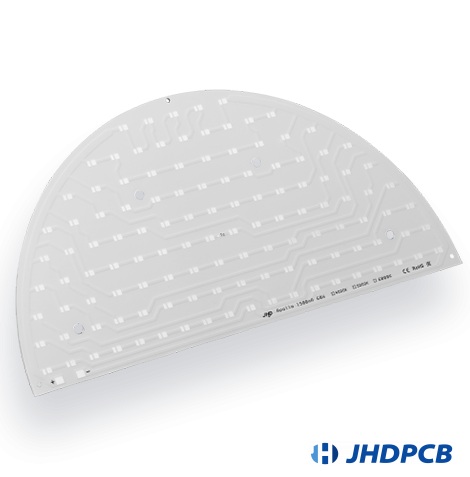
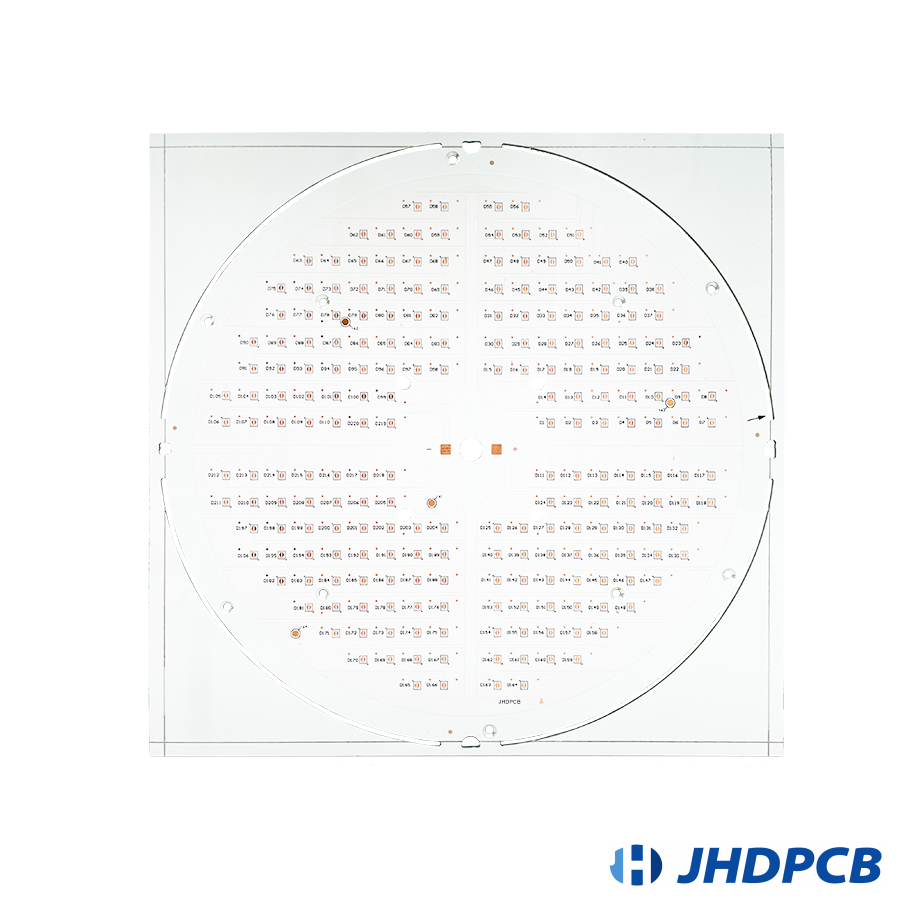
Construction of Aluminum PCBs
Copper layer (Circuit Layer):
The copper layer (Circuit Layer) is usually a layer of copper foil, ranging in thickness from 0.5 to 6 ounces. After correct etching, it can realize the function of conduction, which is the most important layer of the PCB.
Base layer:
This layer consists of an aluminum alloy substrate. The use of aluminum allows this type of PCB to have better heat dissipation and rigidity, making it suitable for large-sized PCB designs.
Thermal cladding layer:
The thermal cladding layer is usually made of FR4 prepreg(1080) or epoxy resin mixed with high thermal conductivity ceramic powder. Detail different please refer to our article The types of thermal cladding layer. It absorbs heat when current flows through the circuit. This is transferred to the aluminum base, where the heat is dissipated.
Solder Mask:
The solder mask can prevent the circuit layer from directly contacting the air and prevent the oxidation of the circuit board.For more information on surface treatment process please refer to our “Surface finish“
What Are The Advantages Of Aluminum PCBs?
Light weight: Aluminum is a surprisingly lightweight metal due to its incredible durability. Aluminum adds strength and resilience without adding extra weight. This is why it is widely used.
Environmentally friendly: Aluminum is non-toxic and recyclable. Therefore, the use of this aluminum PCB helps maintain the health of our earth.
Better heat dissipation performance: High temperatures can severely damage electronics or LED lights. Aluminum PCBs transfer heat better and reduce thermal wear on all components, making your device more durable. Aluminum can actually transfer heat away from vital components, minimizing the harmful effects it can have on the board. Typically, aluminum PCBs transfer heat 8 to 9 times faster than PCBs made with FR-4.
Lower cost: To achieve the same heat dissipation performance, aluminum PCB is often the best choice. It is far cheaper than other metal substrate such as copper base PCB.
Higher durability: Aluminum provides products with strength and durability that FR-4 or CEM1 cannot provide. Aluminum is a strong base material that can reduce accidental breakage during manufacturing process and daily use.
Dimensional stability: As environmental conditions change, especially in high temperature environments. The size of the MCPCB is more stable than the PCB made of FR-4, or CEM1, and it is not prone to some board edge bending problems. After a heating process from 30°C to approximately 150°C, the dimensional change of the aluminum PCB is very small, ranging roughly between 2.5% and 3.0%.
Of course, if your electronics generate a lot of heat during work. And you don’t want to compromise the durability and performance of your product for that reason. Then we still recommend using high TG PCB. It has excellent heat resistance and dimensional stability.
Four criteria for evaluating the quality of aluminum PCB
Heat resistance:
The heat resistance of the PCB mainly adopts the immersion tin method or the float tin method. The method is to set the tin furnace at about 285 degrees Celsius, immerse the aluminum substrate in the tin furnace, take it out after 10S, and observe the phenomenon of layering and foaming after cooling. Our aluminum-based PCB will easily help you control the heat generated by the required equipment, reduce the cost of PCB size and enable you to have a reliable high-performance PCB.
Peel Strength:
Peel Strength means the force required to peel a conductor or foil from a substrate. Usually we test them according to IPC-TM-650 criteria.
Trace to Laminate>9 lb/in (Normal Tg Material)
Trace to Laminate 6 lb/in (High Tg Material)
Layer to Layer>4 lb/in
Thermal Conductivity:
The thermal conductivity of the aluminum substrate is the heat dissipation performance parameters of the aluminum substrate. Thermal conductivity refers to the heat transfer through 1 square meter area in 1 second with a temperature difference of 1 degree (℃) on both sides of a material with a thickness of 1 m under stable heat transfer conditions, and the unit is Watts/meter degrees (W/(m K),
The common thermal conductivity of aluminum substrates is 1.0, 1.5, 2.0, 3.0 W/m.k. The aluminum PCB manufactured by JHDPCB can reach up to 10W/m.k after testing, and can be used in products with a total power of 1000W when used together with a heat sink.
Breakdown Voltage:
In order to prevent lightning strikes, some outdoor products require aluminum substrates to have higher withstand voltage values. High Pot. Test is a commonly used test method. Please refer to our blog for details on how to test the withstand voltage of a PCB.
JHDPCB is one of the top five aluminum PCB manufacturers in China, and we have been committed to providing customers with cost-effective and high-quality aluminum PCBs. We have a full set of automated production equipment and precision testing equipment for metal PCB (aluminum-based PCB, copper-based PCB) production. Over the years, we have been focusing on the R&D and manufacturing of metal circuit boards, Years of experience in aluminum PCB manufacturing. We can be your best source for buying aluminum base PCB boards when you need them.
For more of our advantages, please visit Why to JHDPCB. When you need aluminum-based PCB, please let us know. Our customers rely on us to deliver on time. JHDPCB have been dedicated to providing PCB products for various companies in Fortune 500 companies or start-ups.
